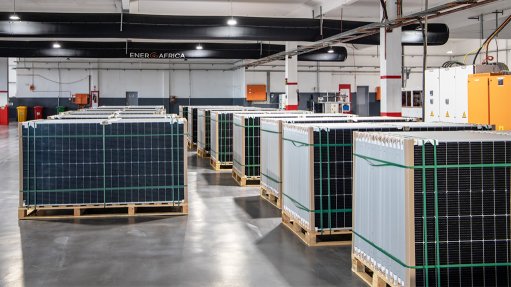Phasing out of HCFCs in HVACR units continues
Amid the regulations on ozone-depleting chlorofluorocarbons (CFC) and hydrochlorofluorocarbons (HCFCs) adopted by the Department of Forestry, Fisheries and the Environment on behalf of South Africa, there has been a resurgence in using alternative refrigerants, such as hydrofluorocarbons (HFCs), in the refrigeration and air conditioning industry, in response to global warming.
The Kigali Amendment to the Montreal Protocol was adopted in October 2016 by the meeting parties of the protocol, and it was this amendment that started the phasing out of HCFC refrigerant gases.
The South African Refrigeration and Air Conditioning Contractors Association (Saracca) is in the second phase of its HCFC phase-out management plan, which started in 2020 and is planned to continue until 2040. The plan is designed to set a programme, as envisioned by the Montreal and Kigali Protocols, for South Africa to phase-out the remaining HCFC products.
The focus is on initiatives to provide awareness and training competence in South Africa.
Refrigeration systems need not revert to using only HFC, as natural refrigerants could also be used. HFC refrigerants are considered an interim refrigerant while the industry transitions away from HCFC refrigerants, explains Saracca managing member David Botha.
“It is perhaps a matter of avoiding reality, as many companies don’t seem to understand that HFCs won’t be imported any longer and South Africa does not produce HFCs, nor does it recover and recycle enough HFCs to meet longer-term demand.”
Many companies are also not complying with the requirement of not releasing ozone depleting and global warming substances into the atmosphere, owing to the high cost of recovery units as they are not inclined to pass the costs on to clients and thus have a disinterest in compliance to recover HFCs to maintain customer relationships.
To address these challenges, practitioners are being trained to safely recover all refrigerants for recycling or destruction if contaminated. Meanwhile, refrigerant gas suppliers have shifted their approach to enable companies to rent recovery cylinders and pay a small daily fee. Upon returning the cylinders, the companies are paid for the recovered refrigerants, which offsets the initial cost of the recovery process, Botha adds.
The recovery of all refrigerants has the advantage of protecting the environment and allowing for a measure of circularity, as “clean” refrigerants can be reused, while companies are afforded the opportunity to create additional revenue by selling recovered refrigerants.
“Saracca promotes the importance of proper maintenance and monitoring of systems that contain HCFCs and HFCs to curb potential environmental damage,” states Botha, noting that this forms a key part of the official training programme underwritten by the company.
Acknowledging Industry Compliance
“We are joining forces with SAQCC Gas to increase the number of roadshows that Saracca is involved in,” notes Botha.
The main focal point of the SAQCC Gas roadshow is to acknowledge practitioners who demonstrate long-standing compliance to legislative requirements through an award ceremony to emphasise the value and importance of compliance.
The Saracca roadshows will focus on the legislative requirements regarding practitioner training, licence renewal and the issuing of certificates of compliance (CoC).
“We will also underpin the value that Saracca members gain by being able to reclaim a large percentage of training costs while driving the adoption [of issuing] electronic CoCs,” he adds.
Saracca aims to have at least 90% of all refrigeration practitioners trained and certified with registered practitioners and companies being 100% compliant with the requirements of the Pressure Equipment Regulation for issuing CoCs.
This will enable practitioners to recover and reuse refrigerants or be competent in retrofitting their refrigeration systems to natural refrigerants, Botha concludes.
Article Enquiry
Email Article
Save Article
Feedback
To advertise email advertising@creamermedia.co.za or click here
Announcements
What's On
Subscribe to improve your user experience...
Option 1 (equivalent of R125 a month):
Receive a weekly copy of Creamer Media's Engineering News & Mining Weekly magazine
(print copy for those in South Africa and e-magazine for those outside of South Africa)
Receive daily email newsletters
Access to full search results
Access archive of magazine back copies
Access to Projects in Progress
Access to ONE Research Report of your choice in PDF format
Option 2 (equivalent of R375 a month):
All benefits from Option 1
PLUS
Access to Creamer Media's Research Channel Africa for ALL Research Reports, in PDF format, on various industrial and mining sectors
including Electricity; Water; Energy Transition; Hydrogen; Roads, Rail and Ports; Coal; Gold; Platinum; Battery Metals; etc.
Already a subscriber?
Forgotten your password?
Receive weekly copy of Creamer Media's Engineering News & Mining Weekly magazine (print copy for those in South Africa and e-magazine for those outside of South Africa)
➕
Recieve daily email newsletters
➕
Access to full search results
➕
Access archive of magazine back copies
➕
Access to Projects in Progress
➕
Access to ONE Research Report of your choice in PDF format
RESEARCH CHANNEL AFRICA
R4500 (equivalent of R375 a month)
SUBSCRIBEAll benefits from Option 1
➕
Access to Creamer Media's Research Channel Africa for ALL Research Reports on various industrial and mining sectors, in PDF format, including on:
Electricity
➕
Water
➕
Energy Transition
➕
Hydrogen
➕
Roads, Rail and Ports
➕
Coal
➕
Gold
➕
Platinum
➕
Battery Metals
➕
etc.
Receive all benefits from Option 1 or Option 2 delivered to numerous people at your company
➕
Multiple User names and Passwords for simultaneous log-ins
➕
Intranet integration access to all in your organisation

















